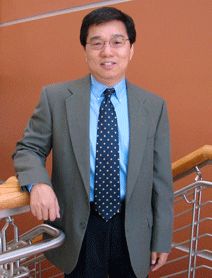


Professor
Associate Chair for Program Development and Outreach
Executive Director, Institute of Biological Interfaces of Engineering (IBIOE)
Research Interests
Orthopaedic Biomechanics and Biomaterials
Testing and Evaluation of Biomaterials
Micro/Nanotechnology-Based Biosensor
Computational Bioengineering
Email guigen@clemson.edu
Office 401-2 Rhodes Research Center
Phone 864-656-4262
Orthopaedic Biomechanics and Biomaterials
Trained in engineering mechanics for his BS, biomechanics for his M.S., and biomaterials for his PhD, Dr. Zhang has been doing research in orthopedic biomechanics and biomaterials since the mid-1980s. His experience ranges from mechanical and/or electrochemical analysis of hard and soft tissues and orthopedic implants to the development of composite biomaterials (e.g., Carbon/PEEK) for arthroplasty applications.
Testing and Evaluation of Biomaterials
Since the mid-1990s, Dr. Zhang has extended his research areas to include the development of novel testing methods and devices for the evaluation of biomaterials, including metals, polymeric composites, and viscoelastic biomaterials, with a focus on their combined mechanical properties, material degradation, and/or electrochemical processes.
Integrated Micro/Nano-Structures and Biosensors
With an eye to making future biomedical devices smart, early in this century, Dr. Zhang further expanded his research areas to take advantage of micro-and nanotechnology to develop micro/nano-featured surfaces and integrated micro and nanostructures. These substrates and structures are intended 1) to interface with cells for the study of biomaterial/cell interactions and 2) to form electrodes for enhanced biosensor development. It is Dr. Zhang’s hope that someday these structures and biosensors will be integrated into implantable devices for monitoring in vivo host integration and related functional and degradative processes. Recently, Dr. Zhang summarized some of this work in Nanoscale Surface Modification for Enhanced Biosensing (Springer).
Integrative Biomedical Investigation Aided by Computational Bioengineering
Early in this century, in an effort to develop the capability to solve real-world problems in meaningful ways, Dr. Zhang started a journey to pursue integrative research to tackle biomedical problems. Through parallel computational modeling and experimentation, his group is able to interpret experimental measurements based on the underlying mechanisms governing the actual performance of many implants and devices. This unique approach allows the lab to look at problems holistically. For example, the following can not only be simulated via modeling, they can also be linked to experimental observations: accelerated corrosion of metallic implants under the influence of mechanical loads, polymeric and interfacial-bounding, degradation-induced loss in mechanical properties of polymeric and composite biomaterials, and the complex processes of enzymatic reactions, material dissolution, and weakening of mechanical strength. Dr. Zhang recently wrote Computational Bioengineering (CRC Press Taylor & Francis Group) to highlight the importance of these capabilities.